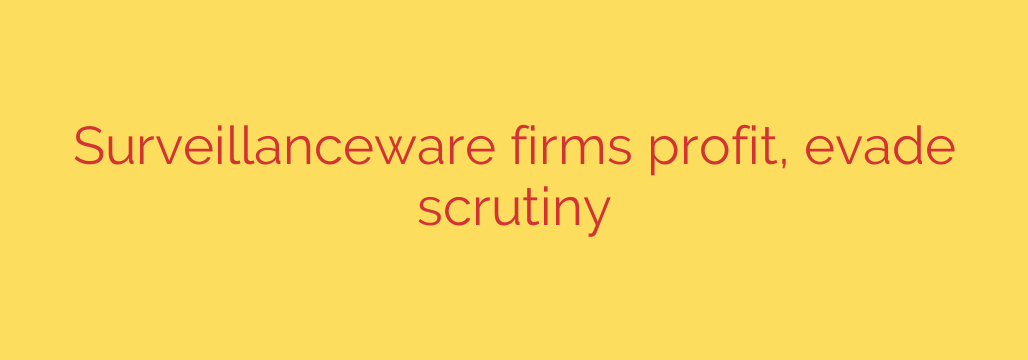
The Secretive World of Commercial Spyware: How Your Data Fuels a Shadowy Industry
Imagine your smartphone, the device that holds your private messages, photos, and location history, being turned into a 24/7 surveillance tool without your knowledge. This isn’t science fiction; it’s the reality of the burgeoning commercial spyware industry, a secretive and highly profitable market where digital intrusion is sold to the highest bidder.
These powerful tools, often referred to as “surveillanceware,” are developed by sophisticated tech companies and sold to government agencies around the world. While the public-facing argument is that they are used to track criminals and terrorists, the evidence reveals a much more disturbing pattern of abuse that threatens privacy, democracy, and personal safety.
The Unseen Threat: Zero-Click Exploits
One of the most alarming developments in this industry is the rise of “zero-click” exploits. Unlike traditional malware that requires a user to click a malicious link or download a compromised file, this advanced form of spyware can infect a device without any user interaction at all.
A simple message or a missed call can be enough to grant an attacker complete control over a target’s phone. This means they can:
- Read encrypted messages from apps like Signal or WhatsApp.
- Activate the microphone and camera to eavesdrop on conversations.
- Track the user’s real-time location.
- Access all files, photos, emails, and contact lists.
Because the infection is invisible, victims are often unaware their digital lives have been completely compromised. This makes zero-click spyware an incredibly potent weapon for clandestine surveillance.
A Business Model Built on Secrecy and Evasion
The companies behind this technology operate in the shadows, deliberately making it difficult to track their activities and hold them accountable. These firms often operate through complex corporate structures, using shell companies and offshore registrations to obscure their operations and ownership. This strategy allows them to navigate legal gray areas, avoid sanctions, and continue selling their products even when implicated in human rights abuses.
This isn’t a back-alley operation. The commercial surveillance industry is backed by significant investment, with private equity firms helping to legitimize and fund these companies. They present themselves as legitimate cybersecurity contractors, but their products frequently end up in the hands of authoritarian regimes and are used to silence dissent.
The primary targets of this technology are rarely hardened criminals. Instead, investigations have repeatedly shown that the victims are journalists, human rights activists, lawyers, and political dissidents. By monitoring their communications and movements, governments can preempt protests, identify sources, and create a chilling effect that stifles free speech and opposition.
Actionable Steps to Protect Your Digital Life
While stopping a state-sponsored attack can be incredibly difficult, you are not powerless. Adopting strong cybersecurity habits can significantly increase your digital resilience and make you a harder target.
Keep Your Devices Updated: Software updates often contain critical security patches that fix the very vulnerabilities spyware exploits. Enable automatic updates on your smartphone and all applications.
Regularly Restart Your Phone: Some of the most common spyware implants are not “persistent,” meaning they cannot survive a reboot. While not a foolproof solution, restarting your device daily can help clear out certain types of malware.
Enable Lockdown Mode (Apple Devices): If you use an iPhone and believe you might be a high-risk target, Apple’s Lockdown Mode provides an extreme level of security. It significantly restricts device functionality to reduce the potential for attack.
Be Skeptical of All Links and Attachments: Even with the threat of zero-clicks, phishing remains a popular infection method. Never click on suspicious links or download files from unknown senders, regardless of whether they arrive via email, text, or social media.
Use Strong, Unique Passwords and Two-Factor Authentication (2FA): Protect your online accounts with strong passwords and enable 2FA wherever possible. This adds a crucial layer of security that can prevent unauthorized access.
The fight for digital privacy is ongoing. As long as the commercial spyware industry is allowed to profit from secrecy and operate without meaningful oversight, the fundamental right to a private life remains under threat. Awareness and personal digital hygiene are the first lines of defense in protecting ourselves from this pervasive and invisible danger.
Source: https://go.theregister.com/feed/www.theregister.com/2025/09/02/commercial_surveillanceware_safe/








